The recovery of six deceased hostages on August 31 in a Hamas tunnel under the southern Gaza Strip city of Rafah has further divided Israel.
This combustible issue has torn the country asunder far more than Israel’s acceptance of German reparations in the 1950s, its lack of preparedness for the 1973 Yom Kippur War, its invasion of Lebanon in 1982, or its embrace of the Oslo peace process from 1993 onward.
Profound anger and grief coursed through Israel after soldiers found the bodies of Hersh Goldberg-Polin, Carmel Gat, Eden Yerushalmi, Alexander Lobanov, Almog Sarusi and Ori Danino, all of whom were executed by Hamas 24 to 48 hours before their corpses were discovered.
Hamas initially claimed they were killed by Israeli forces, but a Hamas spokesman later admitted the truth, and Prime Minister Benjamin Netanyahu promised retribution.
The hostages, ranging in age from 23 to 40, were retrieved eleven days after the bodies of six other hostages — Avraham Munder, Haim Peri, Yoram Metzger, Alexander Dancyg, Nadav Popplewell and Yagev Buchshtab — were found in a tunnel beneath the city of Khan Younis, and just days after an Israeli Arab Bedouin hostage, Farhan al-Qadi, was rescued near Rafah.
Of the 250 hostages abducted on October 7, the day Hamas terrorists stormed into southern Israel and killed roughly 1,200 Israeli civilians, soldiers and foreign nationals, only a little more than 100 have been set free through indirect Israel-Hamas negotiations. Israeli commandos have liberated eight hostages.
By all accounts, about 100 hostages still remain in Gaza. More than 30 hostages are believed to have been killed, some accidentally in Israeli air strikes.
Israeli, Palestinian, American, Egyptian and Qatari negotiators have spent months trying to hammer out an agreement, but have failed to produce one to end the Israel-Hamas war and free the hostages.
In the meantime, Israel continues its military campaign in Gaza, which has morphed into the longest war in its history. This conflict has already claimed the lives of 334 soldiers, an estimated 17,000 Hamas and Islamic Jihad fighters, and approximately 23,ooo Gazan civilians caught in the crossfire.
As the war in Gaza rages, Israel is waging a fairly low-intensity war of attrition with Hezbollah along its border with Lebanon. Israel is also girding for an expected retaliatory attack from its deadliest enemy, Iran, in response to its assassination of Hamas political leader Ismail Haniyeh in Tehran on July 30.
The retrieval of the six murdered hostages has triggered an acrimonious debate in Israel.
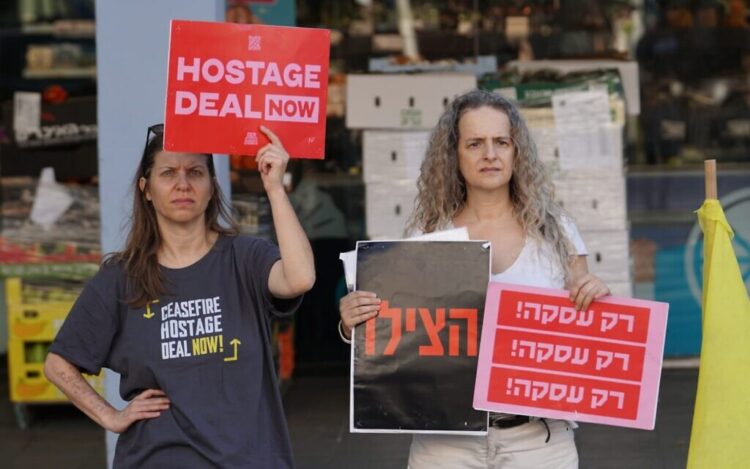
Some Israelis have demanded an immediate ceasefire deal so that the rest of the hostages can be freed. They blame Netanyahu for blocking it. Still others, having applauded Netanyahu’s unwavering resolve to decisively defeat Hamas, have called for the war to be intensified.
U.S. President Joe Biden thinks that Netanyahu has not done enough to secure a hostage deal.
Vowing to “settle accounts” with Hamas, Netanyahu said yesterday that he is personally committed to rescuing the remaining hostages without jeopardizing “our security and our existence.”
Netanyahu maintains that Israel must retain control of the Philadelphi Corridor along Gaza’s border with Egypt. He has categorically rejected two related Hamas demands that would greatly facilitate its survival: a permanent truce and a full Israeli withdrawal from Gaza.
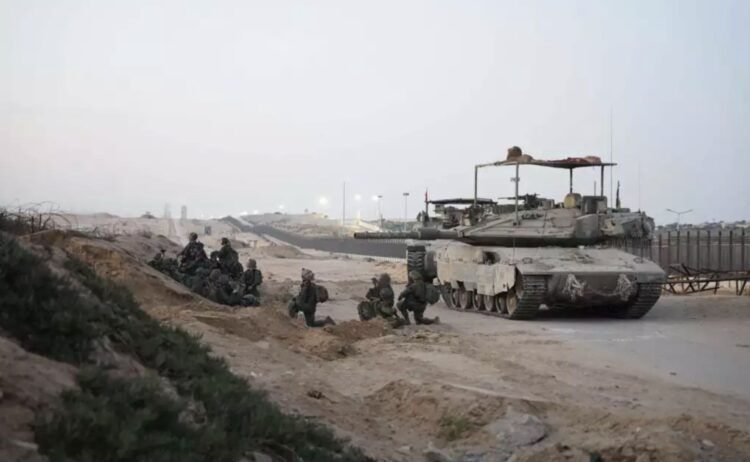
His critics contend that Netanyahu, Israel’s longest-serving prime minister, is resisting an agreement to preserve his far right-wing coalition government, which demands a total victory over Hamas, even at the expense of the hostages’ lives.
Netanyahu has blamed Hamas for the lack of progress in reaching an agreement, arguing that its twin demands would enable it to weather the war.
In his speech yesterday, he said he is prepared to carry out the first phase of a ceasefire plan that would include the release of a number of hostages, a withdrawal of Israeli troops from populated areas, and the release of some Palestinian prisoners held by Israel.
On August 30, the Israeli cabinet backed Netanyahu’s policy, voting overwhelmingly to maintain an Israeli military presence along the Philadelphi Corridor, a key obstacle to a deal as far as Hamas is concerned. Ministers supporting Netanyahu said that this buffer zone is essential to prevent Hamas from smuggling weapons and munitions into Gaza.
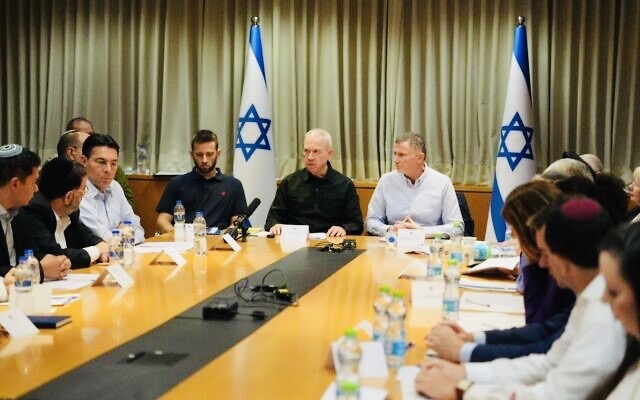
Defence Minister Yoav Gallant was the lone dissenter, saying that the decision will endanger the remaining hostages, block a diplomatic arrangement to end the cross-border battles with Hezbollah, and increase the chances of a regional war in the Middle East.
According to reports, the directors of the Shin Bet and the Mossad, Israel’s domestic and foreign intelligence agencies, have also urged Netanyahu to accept a hostage/ceasefire agreement.
The Tikva Forum, which represents some of the hawkish relatives of the hostages, praised the cabinet position. But the Hostages and Missing Families Forum, which represents many of the relatives of the hostages, denounced it as a betrayal.
On September 2, several hundred thousand Israelis mounted protest marches in Tel Aviv and the rest of the country demanding a hostage-ceasefire deal. These were the largest anti-government rallies in 18 months, far bigger than the nation-wide protests in 2022 and 2023 condemning Netanyahu’s plan to overhaul the judiciary and reduce the power of the Supreme Court.
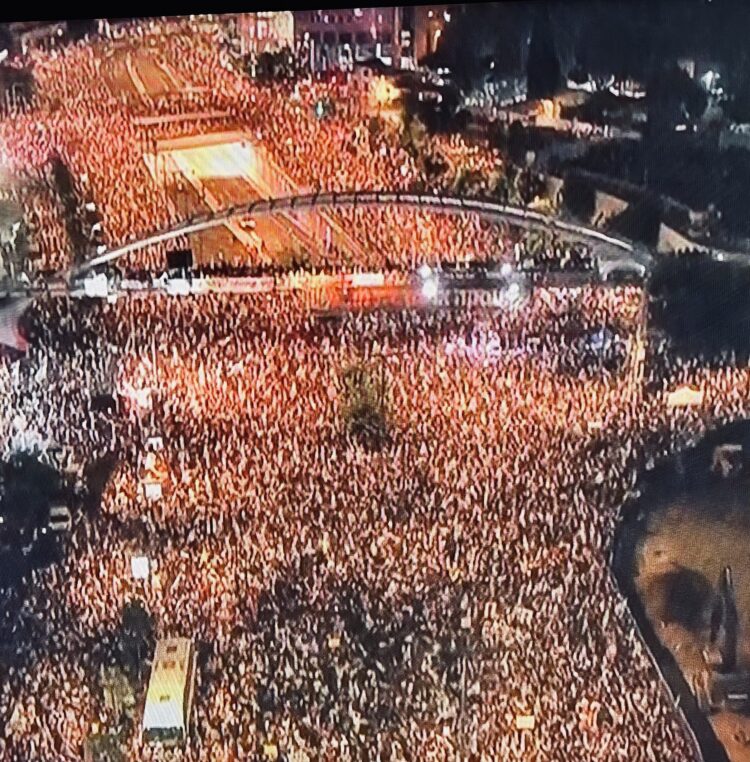
Thousands of demonstrators gathered outside Netanyahu’s residence in Jerusalem, chanting, “Deal. Now” and carrying coffins draped in the Israeli flag. Thousands more marched outside his Likud Party headquarters in Tel Aviv.
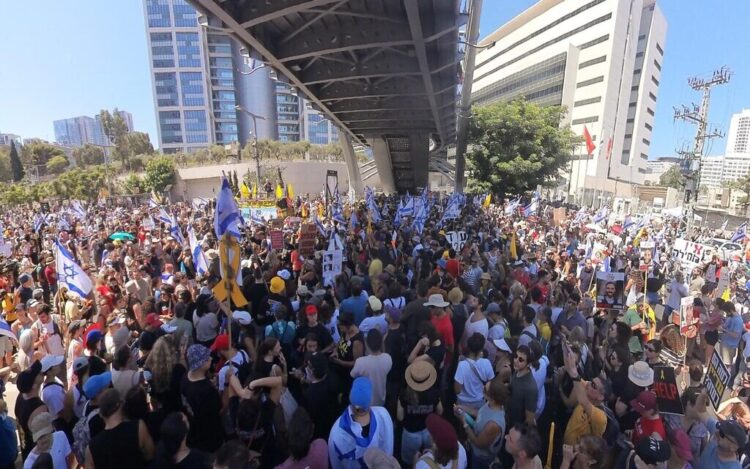
The Histadrut Labor Federation, an umbrella union representing most public sector workers, called for a one-day general strike to seal a deal. Before the Supreme Court halted the strike, workers shut down public services, banks, high tech companies and other businesses. The Israel Business Forum, which represents 200 of Israel’s largest firms, announced it would allow employees to join the strike.
Netanyahu denounced the strike as a disgraceful show of support for Hamas and its leader Yahya Sinwar, according to leaked quotes from the weekly cabinet meeting. Netanyahu said, “We must remain on the Philadelphi Corridor. It’s essential to Israeli security.”
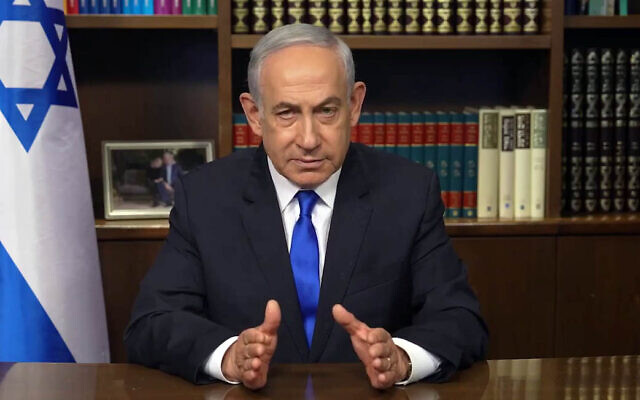
According to Channel 12, Netanyahu described the Philadelphi Corridor as “Hamas’s oxygen supply. I won’t let them rearm and massacre us again. This isn’t merely a diplomatic issue. It’s a strategic, existential issue for the State of Israel.”
Boldly disagreeing with Netanyahu, Gallant posted a message on X urging the cabinet to reverse the vote on the Philadelphi Corridor, which has become one of the main sticking points in Israel’s negotiations with Hamas.
“The decision made was reached under the assumption that there is time, but if we want the hostages alive, there’s no time,” Gallant reportedly told the ministers. “The fact that we prioritize the Philadelphi Corridor at the cost of the lives of the hostages is a moral disgrace.”
Tellingly enough, Iran fully endorses Hamas’ maximalist demands. Several days ago, a senior Islamic Revolutionary Guards Corps Quds Force commander, Deputy Brigadier General Eraj Masjedi, expressed support for them. Masjedi stated that Hamas will continue fighting Israel until Netanyahu accepts its non-negotiable demands.
According to the Institute for the Study of War, an organization based in the United States, Israel’s acceptance of Hamas’ demands would undermine its objectives of destroying Hamas as a military organization and ensuring that Hamas can never rule Gaza again.
It would also mean that the Israeli army could no longer operate along the Philadelphi Corridor and thereby prevent Hamas and other Palestinian armed groups from regrouping, rebuilding their capabilities, and smuggling arms into Gaza.
